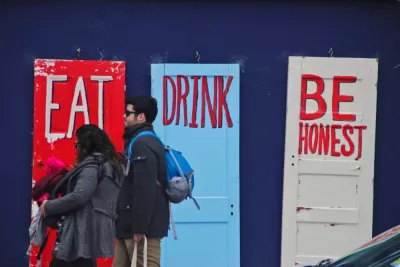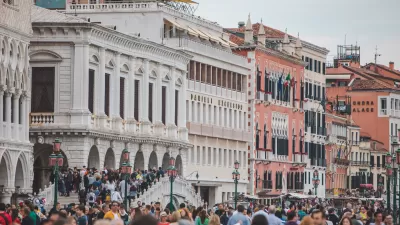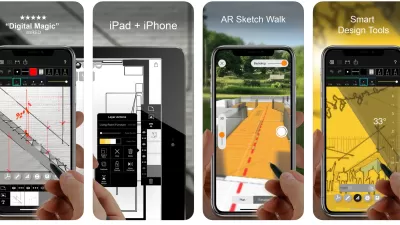There are so many more ways to access local culture as a tourist or an urban explorer than ever before.

Before the internet and apps took off in society, most people who planned trips did so by poring over guidebooks, calling their travel agents, and asking friends for firsthand advice about where to go and when.
Now, although people still do use guidance from people they know, they frequently do the rest on their own with help from apps.
How does that phenomenon boost local economies?
Travel Apps Give Locals a Platform for Offering Unique Experiences
There's a trend toward people prizing experiences more than things. In the past, a traveler might have been happy enough coming home from a destination with a T-shirt and a piece of artwork as souvenirs from their travels. Now, particularly among the millennial generation, people would rather pay money for experiences and keep the memories they offer.
A 2017 Eventbrite survey found that three-quarters of millennials prefer experiences more than objects—and travel-centric apps help them seize them. One called Eatwith caters to foodies and gives them opportunities to purchase dining experiences, often in the homes of locals who are excellent cooks.
Travelers can see the prices of the dining choices before booking them, allowing users to budget and enjoy transparency.
This approach gives income to the people who host travelers at their homes, but it could have a broader effect. Travelers will likely be exposed to new food preparation methods and cuisines during the meal.
Then, they may feel more curious and willing to try restaurants that are not necessarily well-known and promoted heavily on travel websites during the rest of their trip.
Travel Apps Helo People Discover Rural Places
The breadth of content on travel apps, and the fact that developers can update that content so swiftly, means people have no shortage of ideas when planning their itineraries. Whether people want off-the-beaten-path attractions in Ireland or Malaysia, apps can help them figure out how to fill their time away from home.
Without these apps, rural places don't typically get such extensive coverage, and travelers might not know about them at all. Fortunately, some travelers love seeking isolated places to visit.
These apps meet that need by saving them time and giving them tips about which sites are genuinely must-see locations. Then, the increase in tourism to small towns and villages directly stimulates the local economy.
Travel Apps Send Traffic to Small, Little-Known or Unusual Establishments
In addition to apps that give travelers hints about where they should go, there are also more specialized offerings that help people uncover the hidden gems wherever they are. Great Little Place is one that promises to reveal "charming places in the gaps of Google Maps."
It's a platform driven by recommendations, and it features a Tinder-like interface that lets users save the suggestions they like or turn them down. A feature in the app also allows other people to add establishments or indicate they've been to and loved them. People can flag places that don't make the cut as being outstanding, and the app's founders said they monitor the app to maintain high-quality content.
There's also Roadside America, which provides ideas of quirky places to go as people take to the open roadways. Although some of the entries in that app may be more familiar to people than those listed on Great Little Place, it urges individuals to give into their fascination and check out the attractions they pass, bolstering local economies in the process.
Travel Apps Encourage People to Give Into Spontaneity
Various research studies indicate people prefer to use travel apps when making plans or are at least open to the possibility. A survey from Localytics also shows that retention metrics are going up.
The 2016 data from that organization showed 35 percent of people returned to travel apps after a month of use, and the 2018 findings climbed to 47 percent.
Perhaps that's because many travel apps have content people could use again and again, particularly when they're in the mood for last-minute getaways. HotelTonight is an app and website that helps people get appealing deals on last-minute rooms. Although they can book further in advance if that works best for them, HotelTonight has some same-day deals for those who don't mind making spur-of-the-moment plans.
Most people can recall times where they've had the advantage of a long weekend and thought about how they really should make good on their intention to visit a place they always wanted to explore. HotelTonight lets people book rooms in various categories ranging from basic to luxe.
Because its setup allows people to save money by booking at the last minute, the app could encourage people to discover new places without much planning and boost the respective economies of those destinations as they do.
Travel Apps Let Local Experts Make a Side Income
Being in a new place can be overwhelming. Although some travelers who have independent streaks feel comfortable enough to see what a destination offers without a lot of input from others, globetrotters also sometimes prefer having someone show them around—but in a way that's less formal than signing up with a tour group.
Showaround is an app that connects tourists with experienced locals who are ready to give guided tours. Although some of them show people around for free, most charge an hourly rate. It's also possible for users to look for locals who share their interests or know more than most about particular topics.
The people who help visitors get to know the area can make income by sharing their knowledge. As they do, there are more opportunities for those residents to stimulate local economies. They can spend their income nearby or make recommendations to tourists about the things they shouldn't pass up before they leave.
This option is similar to the one mentioned earlier where people can welcome tourists into their homes for meals. However, some individuals—such as those who live with roommates—might not be equipped to bring strangers into their homes to help them have unforgettable experiences.
Acting as a tour guide gives them another option to make money and meet the needs of people who visit.
Apps Have Revolutionized Options for Travel
This overview illustrates why travel apps benefit people who are ready to see what possibilities exist when they travel, as well as the local economies eager to embrace a tourism increase.
As people continue to use apps to solidify their travel arrangements, these advantages should continue and grow.

Planetizen Federal Action Tracker
A weekly monitor of how Trump’s orders and actions are impacting planners and planning in America.

Maui's Vacation Rental Debate Turns Ugly
Verbal attacks, misinformation campaigns and fistfights plague a high-stakes debate to convert thousands of vacation rentals into long-term housing.

Restaurant Patios Were a Pandemic Win — Why Were They so Hard to Keep?
Social distancing requirements and changes in travel patterns prompted cities to pilot new uses for street and sidewalk space. Then it got complicated.

In California Battle of Housing vs. Environment, Housing Just Won
A new state law significantly limits the power of CEQA, an environmental review law that served as a powerful tool for blocking new development.

Boulder Eliminates Parking Minimums Citywide
Officials estimate the cost of building a single underground parking space at up to $100,000.

Orange County, Florida Adopts Largest US “Sprawl Repair” Code
The ‘Orange Code’ seeks to rectify decades of sprawl-inducing, car-oriented development.
Urban Design for Planners 1: Software Tools
This six-course series explores essential urban design concepts using open source software and equips planners with the tools they need to participate fully in the urban design process.
Planning for Universal Design
Learn the tools for implementing Universal Design in planning regulations.
Heyer Gruel & Associates PA
JM Goldson LLC
Custer County Colorado
City of Camden Redevelopment Agency
City of Astoria
Transportation Research & Education Center (TREC) at Portland State University
Jefferson Parish Government
Camden Redevelopment Agency
City of Claremont






























